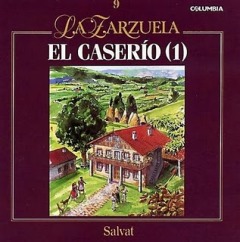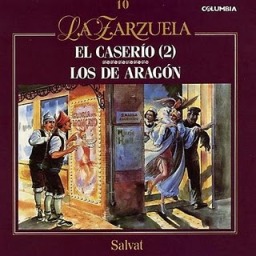Jésus Guridi - El Caserio • José Serrano - Los de Aragon (1990)
Jésus Guridi - El Caserio • José Serrano - Los de Aragon (1990)

El Caserio:
Acto I
01 Preludio y coro
02 Coro general
03 Dúo de Ana Mari y Joshé Miguel
04 Chomin, Manu y Joshé Miguel
05 Romanza de Santi play
06 Final del acto I
Acto II
07 Preludio del acto II
08 Los de Elgóibar, Mingorreta y Lecanda II
09 Romanza de Joshé Miguel
10 Coro general
11 Dúo de Ana Mari y Santi play
12 Dúo de Joshé Miguel y Chomin
13 Final del acto II
Acto III
14 Preludio del acto III. Romanza de Ana Mari y Coro
15 Inosensia y Chomin
16 Final de la obra
Pilar Lorengar: Soprano (Ana Mari)
Joaquina Belaustegui: Soprano (Inosensia)
Manuel Ausensi: Baritono (Santi)
Mari Carmen Perez Parral: Soprano (Eustasia)
Carlos Munguia: Tenor (Joshe Miguel)
Jullo Uribe: Tenor (Txomin)
Jose Maria Maiza: Baritono (Manu)
Juan Gorostidi: Director del coro
Julian Perea: Maestro concertador
Ataúlfo Argenta: Director
Gran Orquesta Sinfónica
Coro de Cámara del Orfeón Donostiarra
Los de Aragón:

1. Copla
2. Romanza play
3. Ma Petite Tres Jolie Poupee
4. Vuelvam Las Horas Lejanas
5. Cantemos A La Vigren
6. Dios Te Salve Maria play
7. Duo
8. Palomica Aragonesa
Lilly Berchman - Gloria
Vicente Simón - Agustin
Santiago Ramalle - Cantador
Coro de Radio Nacional de Madrid
Orquesta de Cámara de Madrid
Daniel Montorio y Enrique Navarro
Jesús Guridi Vidaola (Vitoria, 25 de septiembre de 1886 - Madrid, 7 de abril de 1961) fue un compositor vasco. Entre sus obras destacan El Caserío, Diez melodías vascas y Amaya.
Muy influido por Wagner y los músicos del romanticismo tardío, encuentra en las raíces del folclore vasco su inspiración y las primeras notas que más tarde darán cuerpo y alma a sus composiciones. Guridi abarca con solidez un enorme abanico de géneros: música de cámara (cuartetos para cuerda), composiciones vocales (corales), orquestales, piezas religiosas para órgano, óperas y zarzuelas. Entre sus obras destacan: El caserío (1926), Diez melodías vascas (1940), Así cantan los niños (1909), Amaya (1920), Mirentxu (1910), Una aventura de Don Quijote (1916), La meiga (1929), Seis canciones castellanas (1939), Sinfonía pirenaica (1945) y Homenaje a Walt Disney (1956).
The music of Jesús Guridi (1886-1961) has been a real discovery for me in the past few years. This recording of his 1926 zarzuela 'El Caserío' ('The Homestead') increases my enjoyment of his always tuneful and skillfully orchestrated music by adding the one of his theatrical works to Naxos's Spanish Classics series. This three-act zarzuela is the first of several Guridi wrote to Spanish (as opposed to Basque) libretti but on Basque themes. The story is a kind of 'Meistersinger' set in a fictional Basque village. Santi, an aging homestead-owner, a kind of Hans Sachs, loves his niece Ana Mari, the daughter of his long-dead love who had instead married one of Santi's brothers. She, too, loves her uncle and would indeed marry him except that she is secretly in love with her cousin, the profligate charmer José Miguel, who initially is not interested in her. As the plot proceeds José Miguel comes to recognize that he loves Ana Mari, Santi renounces his claim on his niece and all ends well.
This zarzuela contains much folk-music, both real and that composed by Guridi, and much of it is in the quintessential Basque 5/8 rhythms of the 'zortziko' and includes an 'espatadantza' (Basque sword dance). The prelude to Act II is particularly effective containing, as it does, all the work's main themes. There is a particularly affecting aria by Santi, 'Sasibill, mi caserío' ('Sasibill, my homestead') in which he sings of his love for his ancestral home. It is reprised in the finale. Another aria, sometimes excerpted from the opera, is 'Yo no sé que veo en Ana Mari' ('I don't know what I see in Ana Mari') in which José Miguel suddenly recognizes that he is in love with his cousin Ana Mari. Emilio Sánchez, singing José Miguel, has a virile baritonal tenor that is quite effective. Ana Rodrigo's Ana Mari is lyrical and lovely if occasionally strained on top. It is a real pleasure to have the wise portrayal of Santi by one of the long-time mainstays of Spanish opera, baritone Vicente Sardinero, who unfortunately died not long after this recording was made in 2001. The secondary parts are well-taken and the chorus, so important in this zarzuela's folk setting, is the excellent Sociedad Coral de Bilbao. Not enough good can be said for the orchestral accompaniment by the Orquesta Sinfónica de Bilbao under the flexible conducting of Juan José Mena, who has conducted others in the Naxos series of recordings of Guridi's music.
I can recommend this CD even for someone who has no idea what the music of Guridi might sound like because it is unfailingly melodic, rhythmically alive, full of local color and fine singing. I earlier compared it thematically to 'Die Meistersinger' (there's even a poetry contest -- rather than a singing contest as in 'Meistersinger' but of course the poetry is sung!) but otherwise it is probably closest in its use of folk song and folkways as well as nationalistic fervor to 'The Bartered Bride.' I've been humming bits of it for days. ---Scott Morrisom
José Serrano Simeón was born in Sueca, Valencia on 14th October 1873, son of the conductor of the town band. His father gave him his first music lessons - by the age of five he knew his sol-fa, and at twelve he could play violin and guitar with proficiency. In 1889 he left for Valencia, spending two years there in the Conservatoire studying piano, violin and composition with Salvador Giner. In 1892 he took a scholarship to Madrid - only to return home a year later, disillusioned with the capital artistically as well as economically.
Five years later came the turning point. He took the chance to work as amanuensis for the nearly blind Caballero, collaborating on the scoring of Gigantes y Cabezudos, and writing up his experiences in the musical journal, El Salonillo. In 1900 he was generously offered the libretto of El motete by the famous Alvarez Quintero brothers. The work was a decided success, marking as it did the arrival of a new style to suit the new century. From then on he was never short of commissions, taking his place amongst the most prolific zarzueleros of the day. He also wrote some songs and vocal works, including the celebrated Hymn to Valencia (1909) - and an opera, unfinished at his death, La venta de los gatos (1943.) He died in Madrid on 8th March, 1941. Of Serrano's 50 or so zarzuelas, a considerable number have managed to retain their place in public affection. La reina mora (1903); the exotic tragedy Moros y Cristianos (1905); El pollo Tejada (1906) and El amigo Melquíades (1914),both written with Quinito Valverde; Alma de Dios (1907); L'alegría del batallíon (1909); La canción del olvido (1916) with its ever-popular "Soldado de Nápoli"; and Los de Aragon (1927) are all in the one-act tradition of the género chico. Some of his later works, such as Los Claveles (one act, 1929) and La dolorosa (1930) - his last and perhaps most respected score - are longer and more ambitious in scope. Golondrina de Madrid, on which he was working at the time of his death, proved a failure when finally produced in San Sebastian in 1944.
His musical personality is robust rather than specially distinctive - though he often taps a rich vein of melodic inspiration. He fully recognised his own limited technical ability, keeping his harmonies and orchestrations simple, and his strongest suit is undoubtedly a powerful theatrical intuition and unfailing power to touch the heart. He certainly directed the mood of the género chico away from the sophisticated, urban wit of Chapí or Bretón towards a simpler, popular theatre of the emotions. In this sense, Serrano is a true heir of Chueca and Caballero - with a substantial tranfusion of red blood from Puccini and his verismo contemporaries.
download: uploaded yandex 4shared mediafire solidfiles mega zalivalka filecloudio anonfiles oboom
Last Updated (Tuesday, 08 July 2014 16:28)








